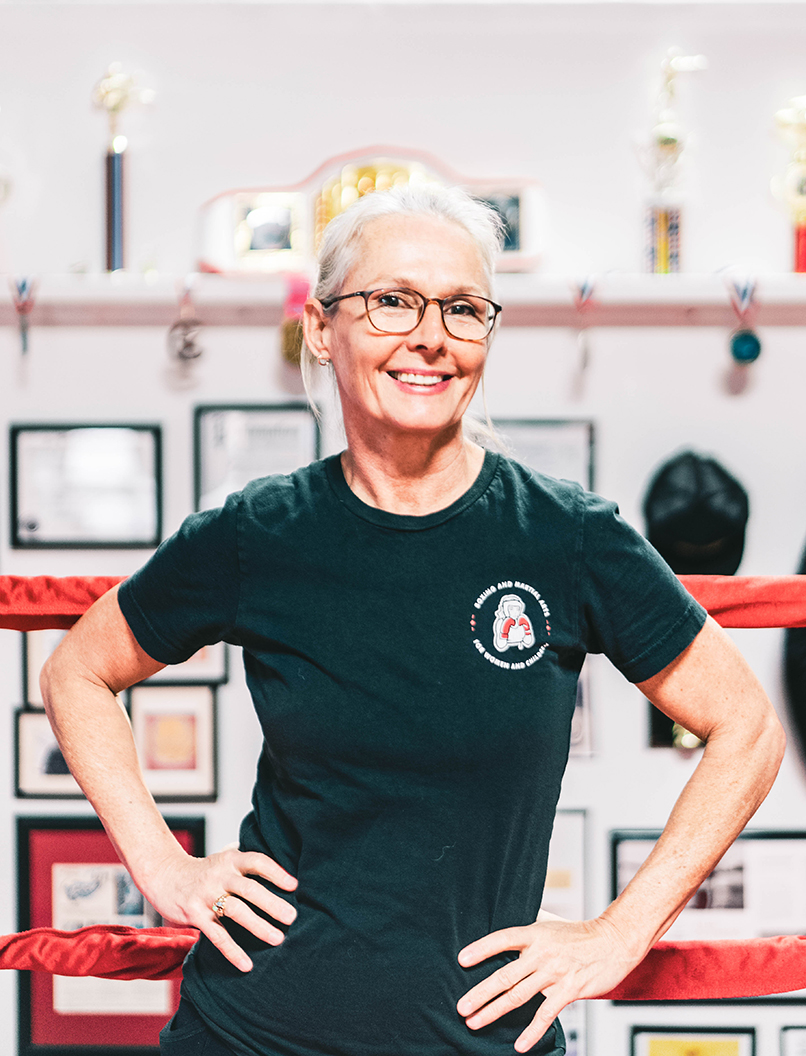Julia Gschwind founded Austin Women’s Boxing Club to help others like her feel like they belong.
By Julia Gschwind, Photo courtesy of Julia Gschwind
After almost two decades of coaching boxing, it still surprises me when a male boxing coach approaches me with this curious look on his face and a tone of wonder, disbelief and arrogance: “Are you a coach?” (Meanwhile, I’m obviously warming up my boxer for her match at a national qualifier amongst dozens of other coaches and boxers.)
“Oh that’s so cool!”
“How long have you been doing this?”
“Do you need help?”
“I can show you the ropes.”
“Oh look, you know how to work the mitts really well.”
I’ve tried all different kinds of responses ranging from laughing it off, engaging politely in the conversation, confronting them about their bias, ignoring them, etc. Now I just change the subject and ask them questions back, but it hardly ever feels right.
I grew up in Germany, raised in a culture and generation where I felt that I was never good enough, never liking the “correct” things: being quiet, sitting still and studying, being calm, wearing pretty shoes and dresses. Instead, I liked to move, be free, get dirty and be controversial…and hit things, as I found out in my late 20s.
I had already immigrated to the United States, finding the freedom and open-mindedness that I had always craved. When I first stepped into a Muay Thai boxing gym, my world was turned upside down. Being strong, aggressive and physical was encouraged, something that was so foreign to me and yet something I yearned for. Every punch and kick I learned felt so right, and it gave my body and mind an outlet that made everything else disappear. I trained in the gym, on my own, whenever I could; my saddest days were holidays when the gym was closed.
Over the years, I specialized in amateur boxing and competed for the U.S. and Germany during a time when women’s boxing was barely emerging and we were still fighting for the right to participate in the Olympics. It was normal to me that all the other boxers and coaches in the gym were male, that I would get regularly harassed by them, that I was either being sexualized or ridiculed.

Years later, through parenthood and a divorce, I was forced into making a career decision. I could continue working as a project manager or follow my passion and be able to control the time I spent with my kids. I chose the latter and opened Austin Women’s Boxing Club in 2007, with the vision of providing a safe, inclusive space for women-identified and nonbinary folx to experience the passion of boxing without any of the harassment often found at male-dominated gyms.
Fifteen-plus years later, the highlights of my days at work include witnessing boxers of all ages develop the confidence to be okay with who they truly are. They work through their anxiety progressively by tackling incrementally more challenging skills. Boxing is a tough sport; you learn not to flinch when a punch is coming at you and instead stay calm under pressure. That’s why it’s important to acknowledge the small successes (e.g., jumping rope for one consecutive minute or developing a powerful jab). It is through these cumulative successes, consistent work and a willingness to continue to show up that you develop true confidence.
I don’t think I could have created Austin Women’s Boxing Club without the amazing people of Austin. This special community of people are willing to connect, authentically share themselves with one another and are inclusive like I’ve never experienced anywhere else. It amazes me every day how our boxers lift each other up in all areas of life, not just at the gym.
As far as being called out for being a female coach, it’s gotten much better since I’ve started to work for USA Boxing as a clinician delivering coach’s certification courses and being part of the High Performance Coaching squad. The culture has begun to change, and the upcoming generation of female coaches will take things beyond what is presently available to us. Even though I may be a small part of the next step for women in my field, I’m extremely proud to be part of that process.


